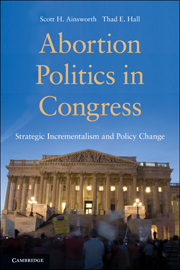Book contents
- Frontmatter
- Contents
- Tables
- Figures
- Acknowledgments
- Part I Strategic Incrementalism and the Political Backdrop for Abortion Politics in Congress
- Part II Abortion in the House
- 5 Sponsors of Abortion Policies
- 6 Playing the Field: Committee Referrals of Abortion-Related Proposals
- 7 Conclusion
- References
- Index
6 - Playing the Field: Committee Referrals of Abortion-Related Proposals
Published online by Cambridge University Press: 05 June 2012
- Frontmatter
- Contents
- Tables
- Figures
- Acknowledgments
- Part I Strategic Incrementalism and the Political Backdrop for Abortion Politics in Congress
- Part II Abortion in the House
- 5 Sponsors of Abortion Policies
- 6 Playing the Field: Committee Referrals of Abortion-Related Proposals
- 7 Conclusion
- References
- Index
Summary
Perhaps the most important thing to know about committees in the House of Representatives … is that they are jurisdiction-specific subunits of their parent chamber. (Shepsle 1978, 4, emphasis in the original)
Pick any twenty pages in the Congressional Record or watch an hour of C-SPAN, and you will see telltale signs of jurisdictional intrigues. (King 1997, 1)
Introduction
How well established are committee jurisdictions? Are multifaceted policies readily constrained to just one or two committee jurisdictions? As we noted in Chapter 3, abortion lies at the intersection of many fundamental human motivations, not the least of which are sex and procreation. Those fundamental motivations and advances in medical technologies and health services sometimes fail to mesh in a smooth, consistent, or coherent fashion. Views on abortion are intertwined with views on the definition of life, individualism, privacy, womanhood, and feminism, as well as morality and religion and the roles of the church and state in our lives. How is a policy with such a dramatic impact on our senses of being handled by Congress? How do policies with such dramatic content affect the staid traditions and established procedures of the U.S. House of Representatives? Issues related to clinic access or the free speech rights of physicians or demonstrators might readily find their way to the Committee on the Judiciary, but many abortion-related proposals are far removed from traditional constitutional concerns. For instance, regulations on scientific procedures and commercial research and development might find a more natural home in the Commerce Committee and funding issues are naturally the province of the Appropriations Committee.
David Price (1978) notes that committee activity varies by policy. That is, within committees, not all issues are treated similarly. Committee members typically seek high-salience issues with low conflict. With lower salience, there is little ability to claim credit for legislative efforts, and with higher conflict, the risks of angering an important set of players by addressing the policy are greater. Underlying much of Price’s analysis is the notion that committee decision making reflects various environmental forces like those discussed in the previous chapters. We are interested in determining how the extant literature on committee jurisdictions and members’ decision making apply to abortion politics. Specifically, conflict and salience are both present in abortion politics, but are incremental and nonincremental abortion-related proposals affected similarly? Conflict and salience may vary not only by issue areas but also by the breadth of a proposal.
- Type
- Chapter
- Information
- Abortion Politics in CongressStrategic Incrementalism and Policy Change, pp. 149 - 177Publisher: Cambridge University PressPrint publication year: 2010



